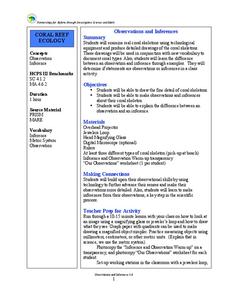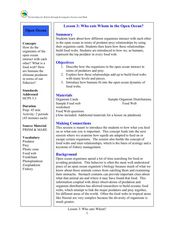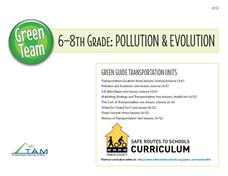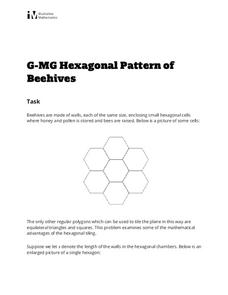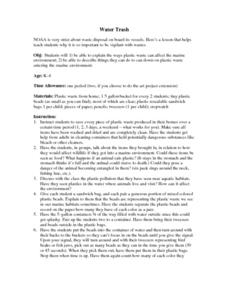Curated OER
Aquaculture Productions Systems Quiz
For this aquaculture system worksheet, students complete 14 true or false and fill in the blanks questions. They rank 4 systems in order of intensity.
Curated OER
What's A Mammal?
Students examine mammals understanding what a mammal is and reviewing the eleven mammal groups. In this science lesson, students play a game known as Mystery Mammal Game. Yet, first students research about the mammal and then give...
Curated OER
Echinoderms
In this biology worksheet, students complete a concept map on echinoderms using the terms provided. They fill in the 7 blanks with the correct answer.
Curated OER
Echinoderms and Chordates
In this biology worksheet, students complete a crossword puzzle with 20 questions on echinoderms and chordates characteristics and features.
Curated OER
Observations and Inferences
Students examine coral skeletons. In this science instructional activity, view real coral skeletons. Students explain the differences between an observation and an inference. Students draw a coral skeleton.
Curated OER
Who Eats Whom in the Open Ocean?
Students examine how organisms interact with one another in the ocean. In this science lesson, students discuss predators and prey in the ocean. Students discuss food webs and how organisms interact with each other.
American Museum of Natural History
Dive Into Worlds Within the Sea
The ocean is a series of ecosystems within an ecosystem. Learners dive into an exploration of ecosystems in an interactive lesson. They identify connections between organisms by following leading prompts within the lesson. The resource...
Safe Routes to School
Pollution & Evolution
Bring together a study of two major scientific topics with a lesson on the relationship between pollution and evolution. With the help of a PowerPoint presentation, hands-on activity. and class demonstration young scientists learn...
MENSA Education & Research Foundation
Ecosystems
Explore the Earth's different ecosystems through four lessons, an assessment, and extension activities. Lessons include informative text and step-by-step instructions to apply knowledge in interactive, and thought provoking ways; such as...
American Museum of Natural History
A Whale of a Tale
What's the most interesting fact about a blue whale? Learners read an interview about the similarities between the Titanosaur and the blue whale displays at the American Museum of Natural History. Pupils learn not only about blue whales...
American Museum of Natural History
Rubber Blubber Gloves
Using gloves, shortening, tape, and a lot of ice, participants experience the feeling of having blubber. The experiment's eight steps follow an informative page about blubber and animals that have it.
Illustrative Mathematics
Hexagonal Pattern of Beehives
Young geometers and biologists investigate the math of nature in an activity that is just the bee's knees. Participants will study the tessellations of hexagons in a beehive, along with the natural rationale behind the specific shape....
Curated OER
The age of majority: How old is old enough?
High schoolers research on the Web and in books the "age of majority" in general and how it applies in their particular states. Explore, too, "emancipation" and whether this is another way for teens to earn additional rights. Students...
Curated OER
Blubber Gloves
The ways that animals adapt to their environments is quite remarkable. For this life science lesson, fifth graders take a look at some of the ways that aquatic animals that live in Arctic or Antarctic waters survive. They perform an...
Curated OER
Aquarium Acrobats
Students create a realistic underwater diorama as a follow-up activity to a field trip to an aquarium. They research and discuss sea creatures and plants that contribute to aquarium life, then create a diorama using research information...
Curated OER
Rate of Coral Growth
Using a table of information provided, middle school marine biologists chart data on a graph to determine the impact of water depth on coral growth in Australia's Great Barrier Reef. Then they answer questions that connect the data to...
Curated OER
Strange Bugs
As individuals or in small groups, marine biologists research and discuss archaea and their unusual behavior as compared to bacteria. Teach them about the chemical makeup of the cell membrane of these strange organisms. This complex...
Curated OER
Fish Anatomy
Add a handy reference sheet about fish anatomy and functioning to your learners' biology or animal notebooks. Though this resource doesn't provide any practice, it makes a useful addition to any study of anatomy, biology, species, fish,...
Curated OER
Glittery Shell Fish
Students find out about varied forms of ocean life, including information on shellfish and how they differ from fish with scales. They identify various types of seashells, and recognize that at one time each shell was a home to a sea...
Curated OER
Lesson Plan fo The Magic Eyes of Little Crab
Interested in a "how and why" story to read with young students? In this storytelling activity, readers will discuss sea creatures, focusing on practicing new terminology through retelling the story. This resource provides a list of...
Curated OER
Phase 5
A colorful presentation on common vowel blends awaits your class. Each of the 25 slides has a two-letter vowel blend in a large circle, accompanied by a smaller circle that has the phonetic sound that the blend makes. Pretty fish and...
Curated OER
Artificial Reef
Students conduct online research to determine how and why artificial reefs are created, and investigate how they benefit marine life and the marine ecology.
Curated OER
Survival of the Fittest
Sixth graders create their own "never before seen" marine creatures and examine how not all creatures in the sea swim, not all have sharp teeth
Curated OER
Water Trash
Students examine how plastic waste affects the marine environment. They describe techniques that reduce plastic waste in this environment after examining plastic waste that accumulates in their own homes.
Other popular searches
- Marine Ocean Zones
- Ocean Fish Life Cycle
- Ocean and Sea Creatures
- Life in the Ocean
- Life on the Ocean
- Origin of Life Ocean






